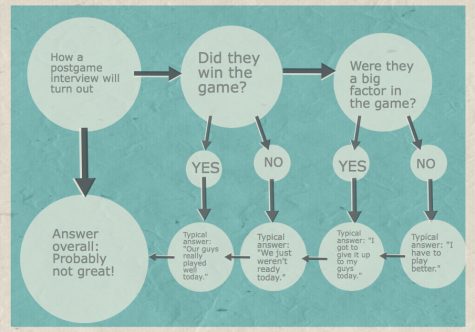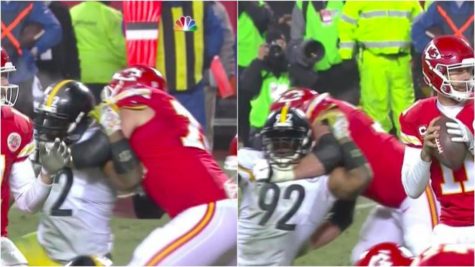Athlete interviews are useless
February 14, 2017

“That was horse (explicit). He shouldn’t even be able to work at Foot Locker,” Chiefs’ tight end Travis Kelce said after a holding call effectively ended the Chiefs’ season against the Pittsburgh Steelers in the NFL Divisional Round in mid January. The hold was on Eric Fisher, a lineman who has struggled to live up to his No.2 overall status. It was pretty blatant. Any NFL fan, even any Chiefs fan, would call this a hold.

Kelce did not think so. Maybe Kelce needs his eyes checked.
But in the moment, you can not totally blame him. That hold cost them the game and the season. He is not going to single-out his teammate for the penalty. There is a lot of emotion in games, especially playoff games. Kelce was clearly in denial about it, and in that moment when something you want so bad is taken away, it is hard not to be.
But the question is, do fans really need to see Kelce flip out? What did Kelce say that is important or informational besides giving sports networks content for the next 24 hours? The only value Kelce’s comments gave us was the question we’re asking right now.
See, that is the problem with athletes these days. They talk, but do not say anything important or meaningful, at least to the people who want to know more and find out why.
The frustrating part is that these days athletes have so many ways they can talk. Social media gives players a huge platform to use (Although, as we saw with Rajon Rondo and the Bulls a couple weeks ago, that can sometimes go wrong). There are more media outlets and writers than ever. They want to know. Fans want to know.
In interviews, athletes always praise their team or speak in very vague language. Something along the lines of, “We played well today. I gotta give it up to our guys.” That told us a lot. But what went well? Or what went wrong? How do you fix those issues? “We’ll work on some things in practice,” is not a good answer. It is vague and meant to be boring, because most athletes do not like the media, or simply are told to not say too much.
It does not matter whether a certain athlete won the game or played well or not. A reporter is getting a vague answer back. After a loss, an athlete will say, “We have to play better from now on. Days like this aren’t acceptable.” After a rough performance, the response is usually “I have to play better. I let my teammates down.”
These are terrible answers. What is an athlete telling us as fans? Are they apologizing?
It is a part of an escape plan. Athletes (newsflash!) don’t like the media. They find them annoying and intrusive.
Since writers, media companies and fans know this is the case, why are they still wanting quotes from athletes?
- There are a lot of illogical fans (mostly young kids) out there who want to hear from their favorite players.
- It is journalism ethics to have primary sources and quotes.
One of those you can change, one of those you cannot.
We need to focus on making fans smarter. Sports fans are idiotic these days. They are full of hot takes and stupidity. Things like play-by-play in sports apps, fantasy sports and Red Zone have killed the smart sports fan. But athletes and coaches not saying anything meaningful hasn’t revived them either.
A good interview or press conference these days ends up in something like this:
Or this:
They are hilarious and will live on forever, but if that happens now, it is a meme.
The case can be made that analysts who appear on postgame shows have replaced athletes explaining what happened. Most of the analysts on TV are gasbags or hot take machines, or are simply not smart enough to explain what is going on. The lack of explanation and logic leads fans to come up with crazy ideas themselves, which leads us to where we are today.
This era of sports talk is a disappointing one. Athletes and analysts don’t get the job done, and fans are too outlandish. It is time for a transition, where we get the answers we really want. We are asking the wrong questions to the wrong people.
Travis Jacobson • Mar 28, 2017 at 10:15 am
Very passionately and well written article. All the information I needed to understand the issue was given in a straight forward and precise way.
Adam Humpal • Mar 27, 2017 at 7:14 pm
This was a very well written article, and one could tell the author was very passionate about the topic. The use of video clips was effective and rare in most articles. The conclusion was very powerful, and did a wonderful job of wrapping about the author’s view.
Kevin Thole • Mar 27, 2017 at 6:47 pm
Another phenomenal article from Hunter Hippel. The writing style feels like a genuine conversation and not like a forced, awkward collection of information. The writer even went so far as to include video clips to back up his point which shows how dedicated this author is.
Noah Ness • Mar 27, 2017 at 1:35 pm
This article is very complete and thorough, and does a good job backing up opinions with specific events that have occurred. It also provides background information to readers that are not as interested in sports but still want to read the story, so that any reader will not have trouble getting the point.